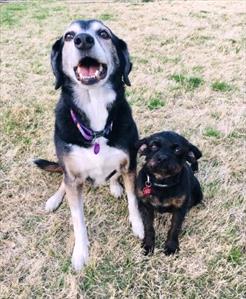A week too easily became a month and then six.
Shug (left) and Spike (right)

My spouse asked me the other day how I thought pets were doing with adapting to the pandemic changes. It was an interesting question. For some families, the pandemic meant pets received more quality time at home with their people. For others, the pandemic has not been a break from typical responsibilities at any time, and this unwanted distraction has lead to unhappy consequences.
Our youngest dog, four-year-old Macie, doesn't seem too affected with the changes. However, our 10-year-old Chi-poo, Spike, is a slightly different story, probably due to the recent passing of his life companion, Shug. She was our senior pup, at 14 years, and the two of them were inseparable for 10 years.
It all happened in rapid succession, much faster than I had imagined it could. So fast, in fact, I got distracted by the pandemic. One evening last summer, I noticed Shug walking oddly and a little slowly with a stiff neck. She had just come in from playing tug-of-war in the backyard with Macie. I immediately noticed her neck was swollen on one side and concluded it had to be an injury from pulling the Frisbee too hard against Macie. Luckily, we were able to get an appointment quickly with her veterinarian and got her on something for pain and inflammation.
It wasn't that simple, as fate would have it. A couple of days later, she coughed some blood onto the floor, so back to the veterinarian we went. Lung masses were seen on chest x-rays, and she was diagnosed with presumptive lung cancer. Thankfully we were able to keep her comfortable during the few weeks before she passed.
Somewhere in the midst of finding out Shug had a disease that would end her life in a month, I had a flashback. Six months prior, I was sitting with Shug in my lap, massaging her back and neck when I noticed a hard, quarter-sized lump deep in the side of her neck. You guessed it! That little mass was in the same location as the big lump that seemingly appeared the night of the tug-of-war incident. I planned to mention it to her veterinarian at an upcoming visit, but I didn't prioritize it as I should have, didn't write a reminder note for myself, and eventually forgot about it entirely.
As you might be able to imagine, life got in the way with the help of the pandemic. I forgot to do anything about the lump I'd noticed. I was busy. A week too easily became a month and then six.
At her age, I had already started to prepare myself for what might be coming, but it came much sooner than expected. The little mass, in my eyes, likely spread at some point to her lungs, as cancer often likes to travel there. I'll never know what could have been or if I could have extended her life a little by having her examined right after I found the mass.
Moving Forward with Shug in Mind
My unfortunate experience with Shug will always serve as a reminder to me of how to be a better pet owner. At the same time, I logically recognize Shug's passing has a lot less to do with me and more to do with the actual cancer and her not being strong enough to fight it any longer. Either way, it's hard to let them go because we want them to be here with us forever. Let my experience of putting an even seemingly minor concern on hold because of a pandemic be a reminder for others too. Panic and distraction in a pandemic doesn't serve anyone well, humans or pets, and pet medical exams, like our own, are seriously important.
Your Pet's Safety
We've watched COVID-19 spread across the globe, and to a host of animal species too. Luckily for our pets, it is typically a mild disease in dogs and cats, and is easy to manage at home. On the contrary, a few other non-domestic species such as beavers and snow leopards appear to have more severe disease.
If you get COVID-19, the CDC recommends that you not interact with pets (e.g., snuggling or face-to-face contact) to prevent passing it to them. Additionally, you should never put masks on a pet or bathe them in sanitizers or chemical disinfectants such as rubbing alcohol or hydrogen peroxide. The main concern is about you giving it to your pet, not the other way around, since transmission from a pet to a person is considered low risk. If you are sick with COVID-19, do not go to the veterinary office if you can avoid it. Ask someone else to take your pet in or see if your veterinarian can do a video visit (telemedicine) if your pet must be seen. If you suspect your pet has COVID-19, contact your veterinarian and express your concern prior to coming in. It's best to avoid any potential spread to others.